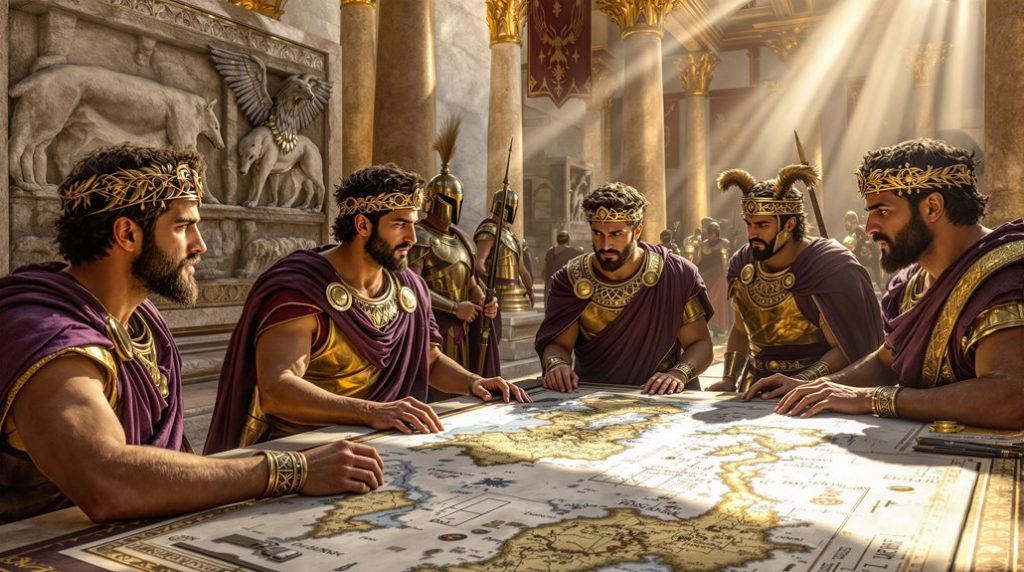Romulus's successors shaped early Rome in fascinating ways, each ruler adding a unique piece to the puzzle.
Walking in their legendary footsteps, I see how Numa brought spiritual reforms, while Ancus Marcius innovated diplomatically. Together, they wove sacred rites with political power, laying the groundwork for Rome's rise.
The magic happened when these foundations began bearing unexpected fruit.
Legacy of Early Roman Kings
Rather than spouting off facts about Old Kingdom pharaohs or Athenian naval strategies, I figure we ought to focus closer to home—on the folks who allowed us the good fortune of being born Roman citizens in the first place. Ever since our founding, Rome's been blessed with the work of great men who did more than just talk a big game; they lived and breathed their commitment to seeing our fledgling city-state survive and thrive.
Take Romulus, for instance. This guy had a vision for Rome that extended far beyond his own lifetime. He knew that for the city to continue growing and prospering, it needed to be a melting pot where all kinds of people could come together and contribute their unique skills and perspectives. Inclusion wasn't just a buzzword for him—it was the linchpin that held everything else together.
But Romulus wasn't the only visionary king Rome was lucky enough to have. Numa Pompilius brought a different kind of wisdom to the table, emphasizing the importance of spirituality and tradition in keeping a society strong. He didn't just pay lip service to the gods—he genuinely believed that by establishing sacred rituals and practices, he could help create a shared identity and sense of purpose among Romans. This spiritual foundation helped strengthen the bonds between citizens and laid the groundwork for many of the cultural touchstones we still celebrate today. His legal and religious reforms would shape Roman society for centuries to come.
These early kings taught us invaluable lessons about building a lasting civilization—one that valued not just political power or military might, but also the wellbeing and participation of all its people. They realized that true strength comes from empowering citizens, respecting diverse talents, and fostering a shared sense of belonging. Even all these years later, their legacy can still be seen in the very fabric of our society. So the next time you stroll through the bustling streets of Rome, just remember—it was visionaries like these who made it all possible.
Military Expansion Under Each Ruler
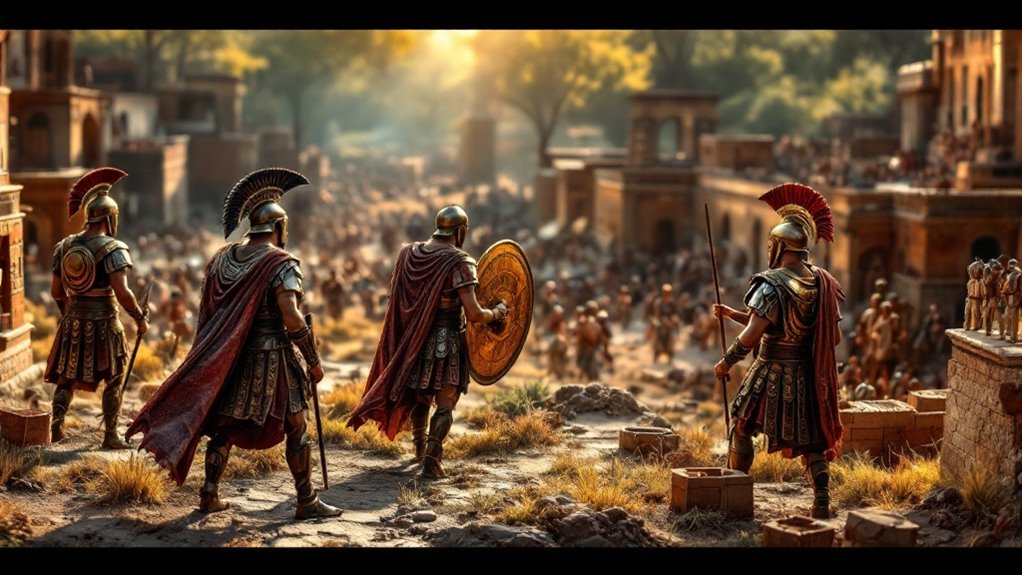
Explore ancient Rome's rise through Romulus's defense of the seven hills. Meet Tullus Hostilius, the warrior king who expanded Rome's territory through strategic conquests. The Roman military might proved unmatched as they defeated multiple adversaries from the Etruscans to the Syrians. Discover how Tarquin dominated the Latin cities, creating a unified kingdom under Rome's growing power.
Early Battles Under Romulus
Romulus, our first king, was a man driven by power and destiny. His warrior spirit forged the path for Rome's earliest military conquests, setting the stage for an empire that would be remembered throughout history. I'm here to tell you how he turned Rome's enemies into allies through bloodshed and brotherhood.
The conflict with the Sabines is a prime example. It started with violence, but evolved into unity when the Sabine women put themselves between their warring relatives. This sacred bond led to Romulus and the Sabine king Tatius joining their peoples as one. Romulus established himself on the fertile plains near the Tiber River, which proved vital for the city's growth and success.
But Romulus wasn't just about fighting. He understood that real power needed structure, so he created the Senate to help guide Rome's future. When he disappeared mysteriously, he left behind not just a city, but the building blocks of an empire.
Tullus Hostilius' War Strategy
Rome's third king, the fierce warrior Tullus Hostilius, transformed peaceful streets into paths of conquest, solidifying our military might through blood and iron. Beginning with the legendary duel of the Horatii against the Curiatii, sealing Alba Longa's fate, Hostilius didn't just conquer – he revolutionized warfare. He crushed the Etruscans, subdued the Sabines, and defeated the formidable coalition of Veii and Fidenae. His legacy, though, extends beyond victories: he built the Curia Hostilia, a senate house standing for centuries, and integrated conquered peoples into our ranks, planting seeds for Rome's future empire.
Tarquin's Latin City Conquest
Rome's earlier kings set the stage for strength, but Tarquin the Proud unleashed an unprecedented wave of military expansion that reshaped our mighty kingdom. Through strategic conquests and alliances, he wove a complex tapestry of power across our Latin neighbors, though his methods would ultimately lead to his downfall.
Like a majestic eagle spreading its wings, Tarquin's conquest transformed our domain:
- He subjugated the fierce Volsci, funneling their wealth into Rome's coffers
- The Latin League became our military stronghold under his rule
- He bound our destinies by marrying his daughter to Tusculum's ruler
- Forceful diplomacy with Etruscan cities expanded our sphere of influence
- The spoils of war funded the construction of the awe-inspiring Temple of Jupiter
However, in his relentless pursuit of dominance, Tarquin planted the seeds of rebellion that would eventually give rise to our beloved republic.
Religious Reforms After Romulus
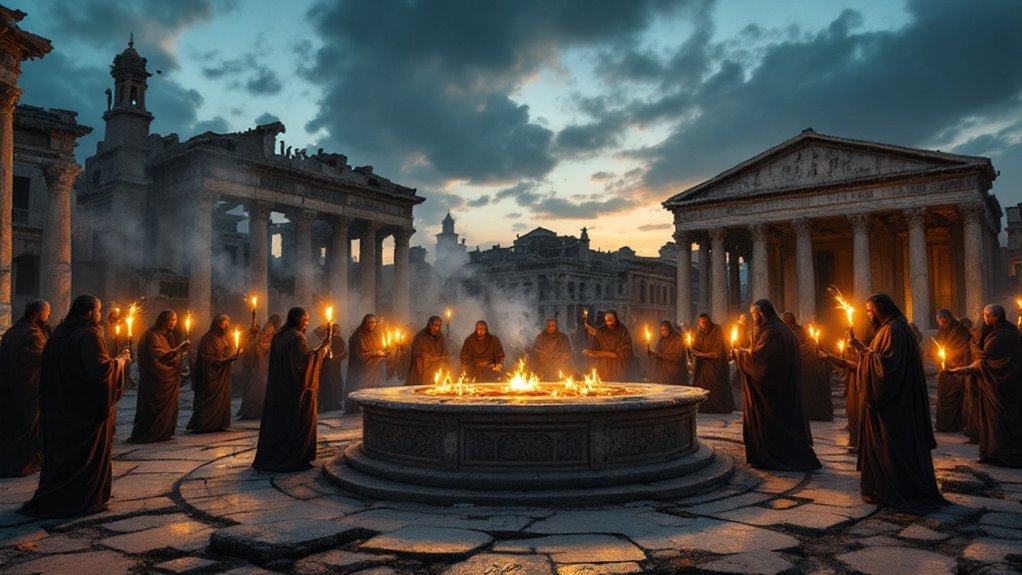
King Numa Pompilius brought major religious changes to Rome after Romulus. I'll tell you how he reshaped our connection with the gods with his wisdom. He set up the Vestal Virgins and Salii priests, weaving divine protection into Rome's fabric.
Numa's successors, Tullus Hostilius and Ancus Marcius, kept his ideas going. They created the fetial priests and built more temples, blending military power with divine right. Together, they forged a strong bond between Rome's power and the gods' favor. We see their legacy in every sacrifice, augury, and temple where we honor the gods who guard our city.
Rome's Political Transformation
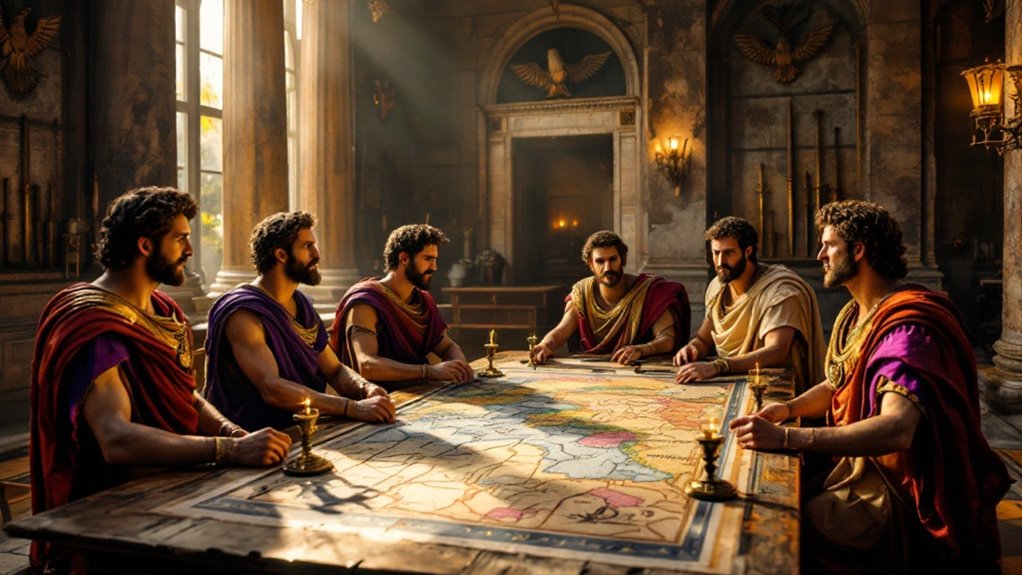
Tracing Rome's evolution from a kingdom to a republic, I observed how its military transformed from Romulus's initial 300 horsemen into a complex force that would come to dominate the ancient world. The Senate's journey from a council of 100 noble elders into a powerful political entity mirrored a hero's progress from humble origins to great influence. Through the sacred spaces where public assemblies gathered, I saw common citizens crossing thresholds into the realm of governance, changing Rome's fate forever.
Military Reforms Under Kings
During Rome's transformative years under its kings, a profound awakening reshaped the kingdom's military structure through Servius Tullius's revolutionary reforms. I'll explain how his vision created a system where wealth and social standing determined one's place in both political and military spheres. Just like the ancient heroes who embarked on quests of transformation, Tullius's reforms marked a symbolic journey from tribal warfare to organized military might.
- Wealthy citizens gained greater voting rights and military positions, forging their path
- Officers, chosen through democratic votes, transcended class boundaries
- The mighty Etruscan clans wielded influence through familial bonds
- Military service became intertwined with political ambition
- The poorest class, the capite censi, waited for their chance at glory until Marius's era
This system would later shake the foundations of Rome itself, as military power became a path to political dominance.
Senate's Growing Political Power
Rising from humble origins, Rome's Senate commenced an epic journey of transformation that paralleled the ascent of legendary heroes. Like a guardian council of wise elders, it grew from 100 to 900 members, wielding power through divine wisdom rather than mere force.
| Senate Power | Symbol of Freedom |
|---|---|
| Legislative Authority | Breaking Chains |
| Foreign Policy | Eagle's Vision |
| Command Authority | Lion's Roar |
| Financial Control | Golden Balance |
| Religious Oversight | Sacred Flame |
The Senate's transformation mirrors the quest for liberty. Through the *senatus consultum*, they challenged tyranny, balanced power with magistrates, and safeguarded Rome's destiny. Although not elected by citizens, they became the voice of order against chaos. In times of danger, they could even appoint a temporary dictator – a necessary paradox in defending freedom.
Public Assembly Development
Three sacred gatherings were born from Rome's political crucible, each destined to shape the future of its people. I'll explain how these meetings became the heart of Roman democracy, where citizens' voices could rise above the whispers of kings. The Curiate Assembly, the oldest of these political temples, divided our ancestors into thirty curiae – sacred groups of families united in purpose and vote.
- The Curiate Assembly elected kings and blessed their decrees with divine authority
- Each curia cast one powerful vote, with sixteen needed for victory
- Citizens gathered in tribal bonds, transforming family ties into political strength
- The Curiate Assembly preserved our sacred connection to the gods
- Later assemblies – Tribal and Centuriate – expanded freedom's reach
Through these assemblies, I've seen how Rome's people forged their chains of bondage into tools of liberty.
Social Classes and Power Structure
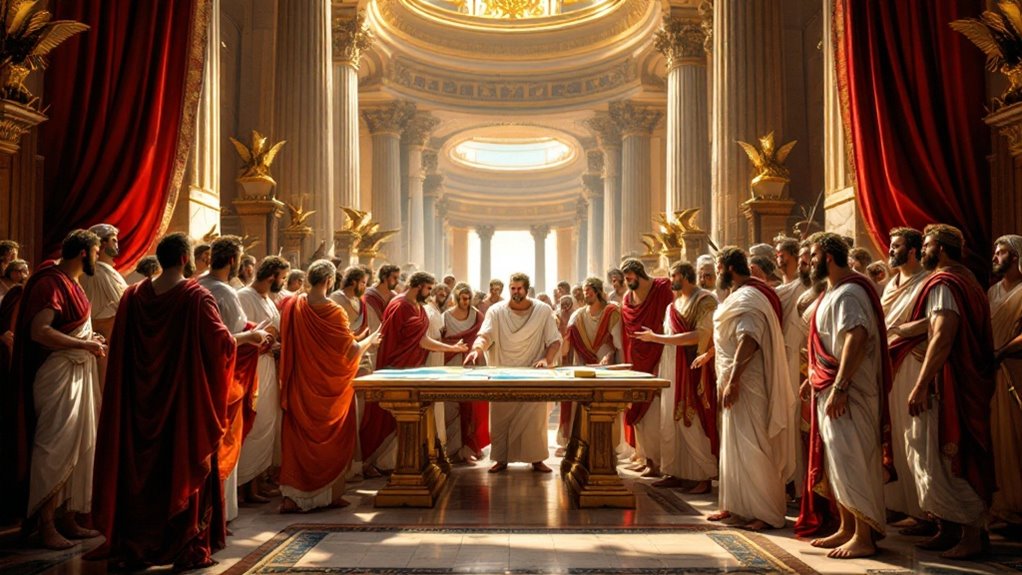
In ancient Rome, a complex social hierarchy emerged, much like the tiered domains of mythical Mount Olympus. At the top were the patricians, the elite class who wielded wealth and influence through their noble birth and ancestral legacy. Below them were the equestrians, who gained power through their economic might and success in commerce. The plebeians, the common folk, worked hard and served in the military to forge their own path.
The king ruled supreme, channeling his authority through the wisdom of the Senate and the decisions of the people's assemblies. While ambitious Romans could climb the social ladder through owning property, military prowess, or forming political alliances, this journey wasn't equal for everyone. Barriers like ancestry, gender, and citizenship played a significant role in shaping one's destiny within this intricate social structure.
Building Projects and Urban Development
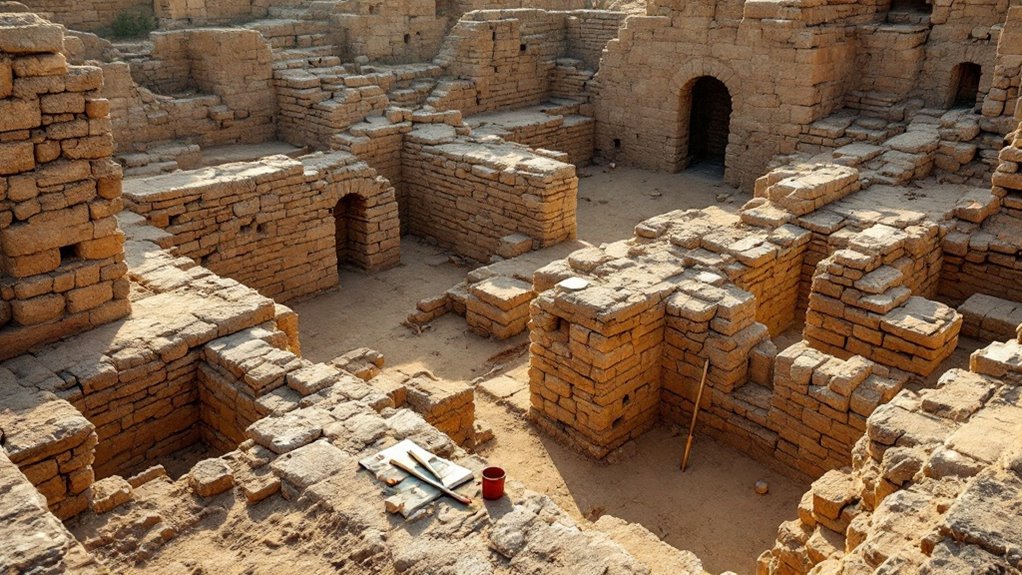
Imagine Roman engineers as master sculptors, skillfully shaping raw marble into enduring masterpieces. They transformed cities through grand construction projects and groundbreaking urban planning, leaving a legacy that still resonates in our modern world. Their grid system, with its sacred intersection of cardine and decumanus, represented more than just practicality – it symbolized the emergence of order from chaos.
Aqueducts stretched across landscapes like immense stone serpents, delivering life-sustaining water. Roads expanded like major arteries, transporting the lifeblood of the empire to far-flung destinations. Forums arose as public spaces where citizens could savour freedom. Public baths emerged as sanctuaries of community wellness. Underground sewers flowed discreetly, preserving the purity of cities.
The engineering feats of the Romans went beyond mere construction – they created spaces where civilization could flourish and freedom could take root.
Frequently Asked Questions
How Did Roman Kings Communicate With Neighboring Kingdoms During Peace Negotiations?
When Roman kings needed to chat with their neighbors about peace, they sent VIP messengers packing fancy gifts and official letters. Trade connections and diplomacy came together to make a tricky but beautiful web of calm between kingdoms.
What Games and Entertainment Were Popular During the Roman Kingdom Period?
During the Roman Kingdom period, various games and forms of entertainment held sway over the populace. Board games, notably Tali and Duodecim Scripta, captivated both noble and common alike, with players vying for victory on squares etched into stone.
In the vibrant streets, one could witness children reenacting epic battles with their simplistic wooden swords and clay figurines, their young imaginations kindling the tales of bravery passed down. Soldiers, in their downtime, would engage in wrestling bouts, honing their skills and strength in a competitive spirit.
The social fabric of Rome was interlaced with these pastimes, reflecting a society that embraced leisure time with enthusiasm while still maintaining a focus on warrior prowess. Though simple in means, these entertainments offered a respite from the rigor of daily life in ancient Rome.
The appeal of such games lay in their ability to bring people together, transcending societal boundaries. For a fleeting moment, a slave and a senator could find themselves on equal footing over a game of chance, or a group of children could lose themselves in the free spirit of play, oblivious to the weight of social hierarchy.
These glimpses of pastime serve as windows into the soul of Roman culture, demonstrating the fundamental human need for diversion, challenge, and connection, which still echoes through the ages.
What Role Did Women Play in the Selection of Roman Kings?
Women wielded significant power behind the scenes when it came to choosing Roman kings, though their influence often went unrecognized. Through strategic marriages and family ties, they played a pivotal role, subtly shaping the course of history from the shadows.
How Did Early Roman Kings Handle Natural Disasters and Public Health?
Early Roman kings recognized the importance of tackling public health issues and natural disasters head-on. They constructed robust aqueduct systems to ensure a steady water supply, implemented strict building regulations to minimize fire risks, and organized relief efforts in times of crisis. By treating public health as a sacred duty, these ancient rulers laid the groundwork for the development of modern infrastructure and disaster management strategies in the city of Rome.
What Trading Relationships Existed Between Rome and Distant Civilizations Under Kings?
The first kings of Rome mainly traded locally with nearby Etruscans and Greeks. Don't expect tales of silk roads and epic trade routes with distant Eastern lands during this early era though. Those famous long-distance trading networks wouldn't really flourish until centuries later, long after Rome had tossed out its kings and moved on to Republican government. So the simple answer is no, there weren't hugely significant trading relationships between Rome and far-off civilizations while it was still under the rule of kings. Local commerce was the main focus at that early stage in Rome's history.

